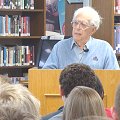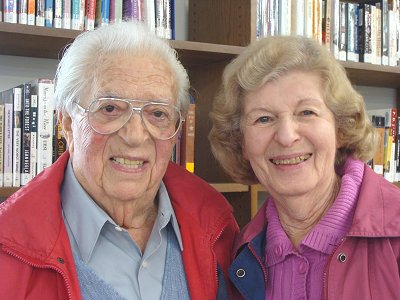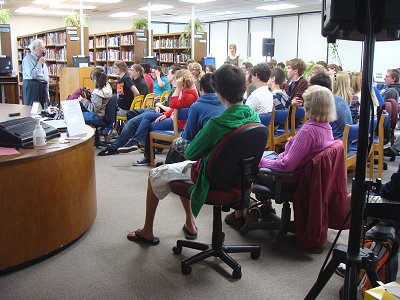- By Dan Veaner
- Around Town
 Print
Print  For nine years, including Wednesday of this week, Fred Voss has told Lansing High School sophomores what it was like when he was about their age. It wasn't good. That's because Voss was a young Jew in Holocaust-era Germany. Since surviving that atrocity he met the love of his life, immigrated to America, served in the U.S. Army, raised a family, and spent 26 years telling his story in the hope that the kind of hatred Hitler instilled in Germans and the horrifying real-life impact it had on millions of people will not be repeated. English Teacher June Martin says Voss is a highly effective speaker who connects with students in a way they remember their whole lives.
For nine years, including Wednesday of this week, Fred Voss has told Lansing High School sophomores what it was like when he was about their age. It wasn't good. That's because Voss was a young Jew in Holocaust-era Germany. Since surviving that atrocity he met the love of his life, immigrated to America, served in the U.S. Army, raised a family, and spent 26 years telling his story in the hope that the kind of hatred Hitler instilled in Germans and the horrifying real-life impact it had on millions of people will not be repeated. English Teacher June Martin says Voss is a highly effective speaker who connects with students in a way they remember their whole lives."They will say they're amazed," says Martin. "Amazed at his strength and resilience. They like his sense of humor. They will remember his tone more so, perhaps, than everything he says. They are amazed that he is 91, that he has such a detailed memory, that his wife is still his sweetheart. That's what they remember."
Voss's home was vandalized. He saw crowds stand by as a temple was burned, leaving nothing but a pile of ashes and burned prayer books. He was singled out by teachers, chased by Gestapo, accosted by SS men who trashed his family's home. His father was interned in a concentration camp, and his mother bailed him out by signing over the family's home and possessions and promising to leave the country. They were lucky -- many other family members and friends were murdered.
Voss preaches against hate, and while it must be hard not to hate the Germans for what was done to him, he says that he and his wife do not hate them.
"It's not easy, but I can't live with hating people, and Ilsa's the same way," he says.
 Fred and Ilsa Voss
Fred and Ilsa VossIt has taken some time to get to that. For their 60th anniversary the Vosses went on the Queen Mary for a trip to England, to revisit the places they met and courted after being ejected from Germany. The ship was taking about 2500 Germans back to Europe, and one of them approached the Vosses in an SS uniform. Voss pretended he didn't speak German, and the man spoke little English.
"He said 'No good, New York. You should come to Frankfort, Germany. High culture'," Voss recalls. "I looked at him and said, 'Frankfort? I remember Frankfort. We kaput Frankfort when I was in the army!' And he walked away."
| The Lansing Star has covered Fred Voss's Lansing High School appearances every year since we began publishing. Here are some links to those stories: |
Voss started speaking after hosting renowned author and speaker Elie Wiesel at in the early 1970s. He and Ilsa were advising the Bucknell University student Hillel organization, which raised money for Wiesel to speak there.
"He spoke at the university and was our house guest," Voss says. "He said to me 'Are you speaking?' I said 'no'. He said 'Why not?' 'What should I say?'
"I thought about it and thought about it and one day the temple where we were had decided to send a bus down with people for the opening of the Holocaust Museum in Washington, D.C. The guy who organized it asked me to speak about the Holocaust on the bus. When we came back from the museum the next day the headline in the local newspaper was 'Holocaust Survivor Speaks On Bus To Museum'. I had no idea there was a reporter on the bus. Then I got telephone calls from churches and universities... and here I am."
At 91 Voss is slowing down a bit with speaking engagements, but is far from finished. He has scaled back on school visits, but still speaks at churches, synagogues, and for community groups. Martin first met him nine years ago when he had moved to Ithaca from Lewisburg, PA. He met with about 15 people from local organizations, promoting himself as a speaker. She immediately took him up on it and Lansing High School was the first local organization to have him speak.
Martin wasn't disappointed. Voss gives an overview of the history that is anything but dry. Before you realize it you are standing in his shoes as a teenager in the middle of a nightmare that is impossible to imagine. Yet it becomes real as you follow Voss through his teenage years that include many of the seminal events in Holocaust-era Germany from the point of view of someone who was really there. He talks about his feelings at the time, and his scramble to stay under the Nazi radar while trying to survive. He talks about the emotion of his triumphal return as a U.S. soldier cleaning up after the war.
"It was extremely moving," Martin says. "Extremely emotional. And what I find interesting is that each time I hear him speak I glean something new, or hear something in a different way."
Voss says that the groups he has addressed have been very receptive to his story and message.
"I have a lot of beautiful letters from students, beautiful letters," he says. "In all the years I have spoken I have only encountered one hate issue. Many years ago I spoke at a church, and I said 'I always ask my father, what have we done to them that they hate us so much?' A woman got up and said, 'I can tell you. You killed our God. You killed Christ.' And the minister asked her to leave immediately. That was the only hate that I encountered, and I have literally spoken to thousands and thousands of people."
Social Studies Teacher notes that with the constant onslaught of bad news his students have actually asked for one day per week when they only discuss good news. After the presentation one of the students asked Voss how he keeps going, to remain so positive after his horrendous experience.
"That ties into the question 'How do you keep going?'," Ferguson said to Voss when the students had left. "You said faith is a big part of that. It's an honest answer and it's that simple. They're always looking for complicated when it's that simple."

Martin says his honesty, attitude, and ability to connect with students on a level that truly moves them and makes them think about the consequences of actions and words on a very personal, as well as global level.
"I am always appreciative of kids who say to me, three, four, five, six years later... 'Oh I remember Mr. Voss. He was one of the best experiences of that year.'," she says. "And Fred will tell you that students come up to him in the grocery store and say 'I remember you when you came and spoke to us.' They remember most that he is a very patient, tolerant, kind man. He is very genuine, and they truly hear his message of tolerance and non-hatred."
Voss typically speaks at Lansing High School around Yom Hashoh, Holocaust Memorial Day which was marked last Sunday. He dedicated his talk to that event. His Lansing talk was recorded this year so that a copy can be sent to Germany to be copied for German schools.
With reporting and photos by Karen Veaner
v7i17



